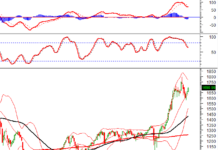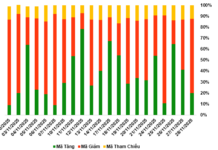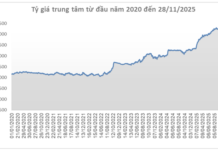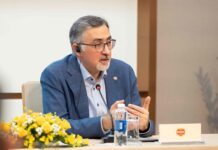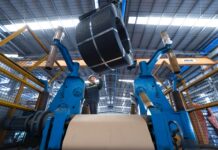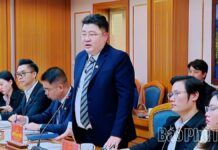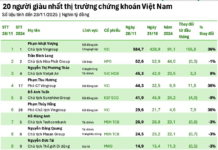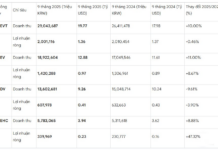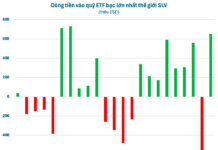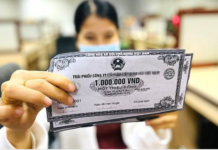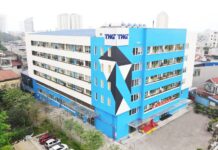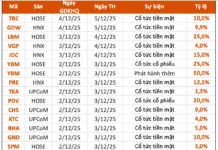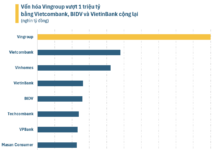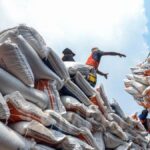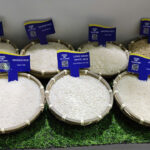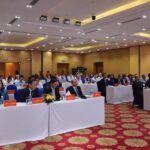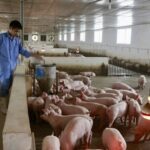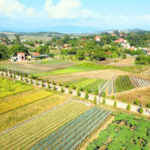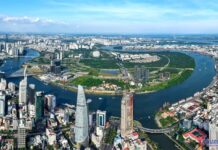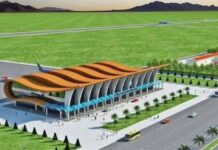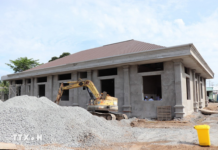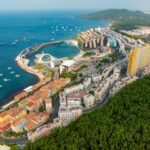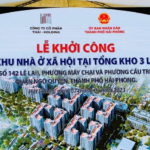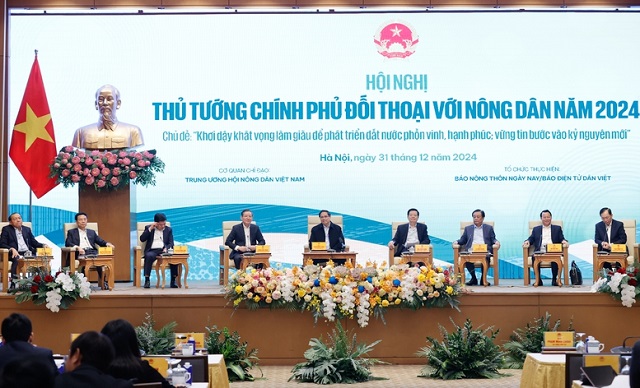
|
Prime Minister emphasizes 9 important issues that related parties need to continue focusing on in the future to promote ecological agriculture, modern rural areas, and civilized farmers. – Photo: VGP/Nhat Bac
|
The conference was held at the Government Headquarters and connected online with the People’s Committees of 63 provinces and centrally-run cities. The participants included leaders of central ministries, sectors, and socio-political organizations, leaders of provinces and centrally-run cities, and representatives of farmers nationwide, with over 4,500 delegates, including more than 2,000 farmers and cooperative representatives.
Through various channels and directly at the conference, the Prime Minister, together with the leaders of ministries, sectors, and central agencies, answered, shared, and discussed with farmers and cooperative representatives on issues of common concern. These included mechanisms, policies, and resources to support farmers in developing cooperative groups and agricultural cooperatives; developing planning for raw material regions, producing goods on a large scale in centralized areas; promoting the concentration and accumulation of agricultural land for large-scale production; digital transformation in the agricultural sector; trade promotion and export market stability for agricultural products; unblocking credit capital for the development of agriculture and rural areas; and improving the quality of vocational training for farmers and rural laborers.
The Prime Minister discussed policies to address difficulties and obstacles in planning, land accumulation, encouraging the development of concentrated raw material regions, agricultural product processing, and credit policies for agriculture, farmers, and rural areas, especially for those affected by Storm No. 3 (Yagi) recently.
The Prime Minister pointed out that we are transitioning from agricultural production to agricultural economic development, which covers a very broad scope and includes many aspects. Therefore, agriculture cannot stand alone but must have an ecosystem of other industries to develop together. To develop this ecosystem, there are many tasks to be done, such as land accumulation, the application of science and technology to improve labor productivity, the establishment of mechanisms and policies on credit and tax, and the development of planning and infrastructure.
Agricultural, forestry, and fishery exports aim for US$100 billion
After answering and sharing with the delegates on issues of common concern, in his conclusion, Prime Minister Pham Minh Chinh appreciated the dialogue, which demonstrated unity and consensus with sentiments for agriculture, rural areas, and farmers.
The Prime Minister informed that in 2024, under the leadership of the Party, directly and regularly by the Politburo and the Secretariat, headed by the General Secretary, with the strong involvement of the entire political system, the consensus of the people and businesses nationwide, and the support and cooperation of international friends, we are expected to achieve and exceed all 15 key targets.
Among the country’s overall achievements, the agriculture and rural development sector and farmers have made significant contributions. Notably, the export turnover of agricultural, forestry, and aquatic products is expected to exceed US$62.5 billion, up 18.7% compared to 2023 (a record level); the trade surplus reaches US$17.9 billion, accounting for 72% of the total export surplus of the entire economy; and Vietnamese agricultural products are present in 190 countries worldwide.
In the major balances of the economy, regarding food security, we not only have enough to eat but also achieve a high surplus, exporting over 9 million tons of rice, earning more than US$5 billion, contributing to ensuring food security for Vietnam and the world. Agriculture continues to play a crucial role and serve as a pillar of the economy.
These achievements and results have contributed to affirming the correctness of the Party and State’s guidelines on modern agricultural development, building modern rural areas, and civilized farmers. This is a great aspiration and a source of national pride that we must realize, no matter how challenging it may be.
“We must achieve the goal of exporting US$100 billion worth of agricultural, forestry, and aquatic products in the coming years,” the Prime Minister stated and sincerely thanked the agriculture and rural development sector and farmers for their contributions to the country’s development.
The Prime Minister emphasized nine critical issues that relevant parties need to continue focusing on in the future to promote ecological agriculture, modern rural areas, and civilized farmers.
First of all, the Prime Minister highlighted that the system of institutions and policies remains the bottleneck of bottlenecks and must be the breakthrough of breakthroughs. He gave the example of how the removal of mechanisms and policies related to the “khoán 10” and “khoán 100” systems in the past transformed Vietnam from a food-deficient country into one of the world’s leading rice exporters, and the poverty rate dropped from 67% to the current 1.93%. This demonstrates that resources stem from thinking, motivation comes from innovation, and strength arises from the people.
The Prime Minister expressed his wish and requested that farmers continue to provide feedback to build and perfect the system of institutions, mechanisms, and policies, including those related to land, taxes, fees, and credit capital. By doing so, we can untie knots in practice, enabling everyone to contribute their strength and resources to development. This will help realize the goals of modern agricultural development, building modern rural areas, and civilized farmers faster, with more momentum and breakthroughs, improving the material and spiritual lives of the people.
The second issue is planning. In the past, due to conditions, circumstances, and the country’s history, planning has not received sufficient attention. Now, with the increasing demands and higher standards of consumers regarding food safety and quality, planning needs more focus, especially sector planning, land-use planning, and planning for industrial clusters serving agricultural production.
The third issue is land. It is necessary to continue reviewing laws and regulations to unlock resources from land and maximize its efficiency, as land is a constant and limited resource. Along with this, we must also exploit outer space, such as developing satellite internet to provide telecommunication services to remote areas, and inner space, such as developing solar and wind energy. Additionally, we should explore underground space to benefit farmers, harness the power of farmers, and promote rural and agricultural development.
The fourth issue is capital and insurance. To get rich, we need capital, and to promote agriculture towards green development and develop key industries according to the plan and products with global demand, we must have credit and insurance policies based on the principle of contribution and benefit. At the same time, we should encourage businesses to cooperate, support, and closely link with farmers to ensure input and output for production, and promote regional linkage, product, market, and supply chain diversification.
The fifth issue is the market. Developing the agricultural economy, rather than self-sufficient agricultural production, requires expanding export markets, including specific markets like Halal food. The state must find consumption markets for farmers’ products, and farmers must ensure quality and build brands for their produce, along with attractive packaging and designs, to capture market share.
“For tourists to buy products, the packaging must be suitable for various transportation methods, be it by plane, train, ship, or even by foot,” the Prime Minister illustrated.
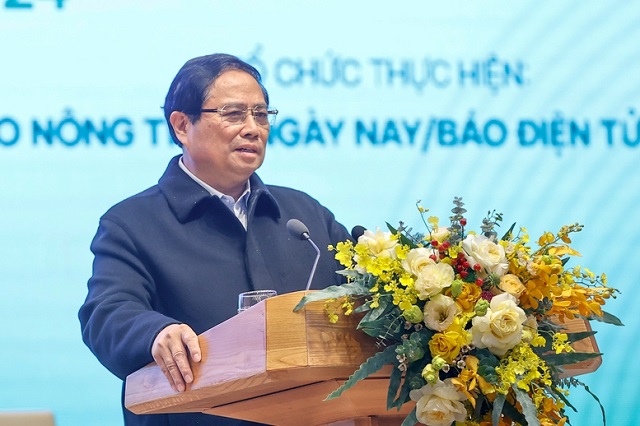
|
At the Dialogue, the Prime Minister discussed policies to address difficulties and obstacles in planning, land accumulation, encouraging the development of concentrated raw material regions, agricultural product processing, etc. – Photo: VGP/Nhat Bac
|
The sixth issue is promoting the application of science and technology, innovation, and creativity, digital transformation, and the digitization of agriculture. We should build a database, research and develop artificial intelligence in the Vietnamese agricultural sector, research, access, and transfer advanced, clean, and green technology in all stages, from choosing what to plant and breed to developing geographical indications, promoting deep processing, and researching packaging and designs. “The database will provide smart solutions, such as determining the best places to grow rice and the most optimal and intelligent cultivation methods,” the Prime Minister said.
The seventh issue is the training of high-quality human resources and the transformation of human resources from the agricultural and rural sectors to the industrial and urban sectors. The Prime Minister noted that sustainable labor transformation means transforming right at the spot, industrializing rural areas, and migrating from agriculture without leaving the countryside.
The eighth issue is identifying culture as an endogenous strength, as a nation survives with its culture, and culture is scientific, popular, and illuminates the path for the nation. “It can still be the ‘Trống Cơm’ song or traditional opera, but with innovation, investment, and the application of science and technology to infuse soul into each tune, it can become cultural and entertainment industries,” the Prime Minister said. He emphasized the need to exploit the unique potential, outstanding opportunities, and competitive advantages of agricultural culture and the civilized rice-growing civilization and to internationalize national cultural values and localize global cultural essence.
The ninth issue is that the grassroots political system must always grasp the aspirations and wishes of farmers and convey the Party and State’s guidelines and policies to them. At the same time, it should proactively propose mechanisms and policies based on reality and mobilize the strength of the political system, businesses, and people to serve development.
The Prime Minister stated that the Party and State have been promoting three strategic breakthroughs regarding institutions, infrastructure, and human resources. Accordingly, we are building a transparent and open institutional system, cutting and simplifying administrative procedures to reduce compliance costs, eliminate the “asking-giving” mechanism, and minimize hassles and harassment. We are also mobilizing all resources for development, constructing strategic infrastructure (in transportation, digital infrastructure, social infrastructure, healthcare, education, and sports) to reduce logistics costs, increase product competitiveness, and save time, costs, and effort for people and businesses. Additionally, we are training human resources and transforming labor, improving the skills, knowledge, and technical qualifications of farmers.
The Prime Minister called on local Party committees and authorities to periodically hold dialogues and listen to farmers’ concerns. Under the leadership of the Party, let’s continue to promote the spirit of self-reliance and self-improvement, innovation, and unity, which is the spiritual foundation of our nation, combining national strength with the power of the era, and moving forward with our hands, brains, skies, and seas, sharing in the benefits and winning together. Let’s advance together with the country, taking firm steps into the new era.
Nhat Quang
– 14:25 31/12/2024
Unlocking Vietnam’s Rice Export Miracle
This year, Vietnam is expected to export approximately 9 million tons of rice, a record-breaking figure despite no increase in cultivation area or yield.
Unveiling a Coastal Paradise: Transforming a 1,000-Year-Old Historic Land into a “Golden Treasure”.
This land was once a desolate marshland, a wild and untamed place. Today, it has been transformed into a lush and bountiful landscape, a testament to the power of nature and the potential that lies within.



